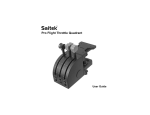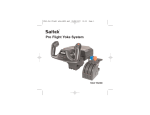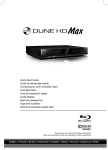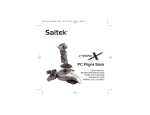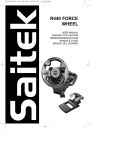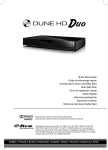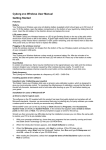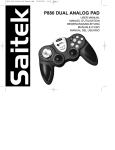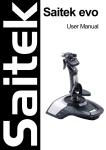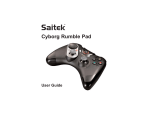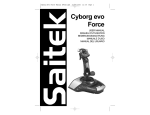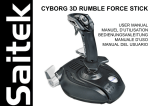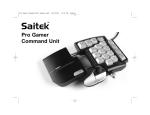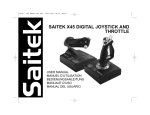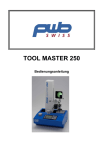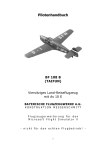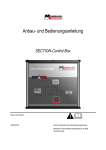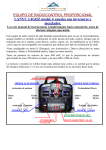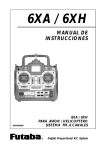Download Saitek Pro Flight Yoke System
Transcript
Saitek TM Pro Flight Yoke System User Guide SAITEK PRO FLIGHT YOKE SYSTEM Congratulations on buying the Saitek Pro Flight Yoke System. The Pro Flight Yoke features realistic controls configurable for all the major flight simulation software to make your flying experiences more realistic. Detachable lever knobs to configure any combination of throttle, flaps, mixture or prop pitch. 2-way rocker switch Single function button 3 position Mode switch (back of right handle) 8-way point of view hat switch 2-way rocker switch Single function button (back of left handle) Smooth travel levers with 0 button detent Three 2-way rocker switches Installing the flight yoke and throttle quadrant Chronograph: Accurate time and stopwatch function to time each leg of your flight. Display also indicates which programming mode is selected. 2 First, fix the Flight Yoke to your table or desk by inserting the prongs of the mounting clamp into the holes on the Yoke base and then tightening the screw mechanism until the yoke is firmly attached (be careful not to overtighten the screw as you may damage the clamp). Next, screw the mounting plate to the Throttle Quadrant using the four screws provided. You can screw the plate to one of two sides of the quadrant depending on how you want to mount the Quadrant - either in front and below your table or on top of it. Please note that whichever way you choose to mount 3 the quadrant, ensure that as you look at the unit the rocker switches are at the bottom. Now tighten the throttle unit clamp's screw mechanism until it is firmly attached to your table. You can also position the throttle quadrant on the left or right side of the flight yoke. Now, connect the Throttle Quadrant to back of the flight yoke with the PS/2-style connector provided. Your Throttle Quadrant comes supplied with additional lever knobs to configure any combination of throttle, flaps, mixture or prop pitch and you can also buy additional quadrants to link together for more complex multi-engined aeroplane configurations. Use the integrated USB Hub on the side of the Pro Flight Yoke to easily connect other parts of the Saitek Pro Flight range of products, such as additional Pro Flight Throttle Quadrants, Pro Flight Rudder Pedals or other peripherals. Software installation for users of Windows® XP, XP64 and Vista A) Drivers Only For Typical Users 1. With your computer switched on, close down any programs that are currently running and insert the Installation CD into your CD-ROM drive. 2. When the Introduction Screen appears, click Install Software to continue. If the CD does not run automatically, select Start from the Windows® Taskbar, then Run and type D:\Setup.exe and click OK - where D:\ is letter of your CD-ROM drive. 3. When the Welcome screen appears, click Next to continue. 4. After reading the Disclaimer, select the I accept the terms of the Disclaimer option and click Next to continue. 5. At the Driver Setup screen, if you haven't already done so, plug the USB cable into one of your computer's USB ports and click on Next. 6. At the Driver Setup screen, click Next to test your controller. 7. When the Saitek Controller screen appears, try out all your controller's buttons and controls to show that it is working properly. When you have finished, click OK. 8. At the Software Setup screen, select Do not install the SST Programming 4 Software and click Next. The Programming Software can be installed at a later date by following instruction (B). below 9. At the Registration screen, select Check this box to register now and follow the on-screen instructions, or you can choose to select this option later. 10.Click on Finish to complete the installation. B) Drivers and Programming Software For Advanced Users Follow points 1 - 7 of the install procedure in A), then at the Software Setup screen, select Install the SST Programming Software and click Next. In the following Software Setup screen, click Next and follow the on-screen instructions. At this point you will be asked to install such features as the Saitek Magic Mouse, HID-compliant mouse, Saitek Magic Keyboard and HID Keyboard Device (these are what XP calls the Programming elements of your Saitek controller). Continue to click on Next and Finish to accept the installation until the Registration screen appears. At the Registration screen, select Check this box to register now and follow the onscreen instructions, or do not select this option and register later. Upon completion of the installation, you have the option to Run Profile Editor, which will give you a view of the programming environment. If you do not wish to see the Profile Editor at this point, just uncheck the box and click on Finish to complete the installation. IMPORTANT INFORMATION Driver updates From time to time there may be updates to the driver and programming software for this product. You can check for the latest software updates by visiting the Saitek website (www.saitek.com) and clicking on Downloads. A drop down menu will appear. Select Drivers and Software. 5 Configuring your Saitek Pro Flight Yoke and Throttle Quadrant for Microsoft Flight Simulator 9 and FS X The Saitek Pro Flight Yoke System's buttons, controls and axes correspond to commonly used functions in Microsoft FS 9 and FS X according to the tables below. As with any software, if you wish to change the function of a button or control, you will need to change the settings of the game software. Function Overview Button 2 Button 1 Mode Selector POV T3 = Button 5 T4 = Button 6 T1 = Button 3 T2 = Button 4 T5 = Button 7 T6 = Button 8 Chronometer Display Function Stopwatch/Clock Flight Yoke controls and corresponding functions in Microsoft Flight Simulator Function Default function in FS 9 and FS X Yoke axis X axis Ailerons Y axis Elevator Main Buttons Button 1 Brakes (apply/release) T1 (button 3) Elevator trim down T2 (button 4) Elevator trim up T3 (button 5) Flaps retract incrementally T4 (button 6) Flaps extend incrementally T5 (button 7) Knee board display/hide T6 (button 8) Landing gear up/down Button 2 Views (cycle) POV Panoramic viewing Other Controls Mode switch Switches Mode when using Saitek Smart Technology (SST) programming software Clock Buttons Function Clock / stopwatch swap Start/Stop Start/stop stopwatch Reset Reset stopwatch Stopwatch Reset Stopwatch Start/Stop 6 7 Function Overview Rx Axis Z Axis Ry Axis Rx Button Ry Button Z Button T5 = Button 19 T6 - Button 20 T1 = Button 15 T2 = Button 16 T3 = Button 17 T4 = Button 18 Quadrant controls and corresponding functions in Microsoft Flight Simulator Function Default function in FS 9 and FS X Quadrant Axis Z axis Throttle Rx axis Flaps Ry axis Spoiler Axis buttons Z button Rx button Ry button Toggle switches T1 T2 T3 T4 T5 T6 (button (button (button (button (button (button Assignable in game Assignable in game Assignable in game 15) 16) 17) 18) 19) 20) Assignable Assignable Assignable Assignable Assignable Assignable in in in in in in game game game game game game How to assign Pro Flight Yoke controls to Flight Simulator functions If you wish to change the controls or set up the additional buttons that have not been assigned by Flight Simulator automatically, then you must use the Assignments (Flight Simulator 2004) or Controls (Flight Simulator X) screen within the game. This is accessed from the Settings menu within the game. When you access the Assignments/Controls screen in Flight Simulator, ensure that the Saitek Pro Flight Yoke is selected in the option labelled Joystick Type. If you wish to reassign any of the buttons on your controller, you must first select the Buttons/Keys tab at the top of the window. If you wish to reassign any of the axes on your controller, (the yoke itself or the levers on the throttle quadrant) you must select Joystick Axes (Flight Simulator 2004) or Control Axes (Flight Simulator X) at the top of the window. Once you have done this, simply find the command that you want to assign to your controller from the list of commands, click it and then click the Change Assignment 8 9 button. A window will appear asking you to move the part of your controller that you want to assign to that command - press/move the button/axis that you want to assign to that command and then click OK. Tip: You may find that when you assign the levers on the quadrant to a command, that they don't appear to work when you test them in the game. If this happens then you must look in the Sensitivities screen (Flight Simulator 2004) or the Calibration tab of the Controls screen (Flight Simulator X) of the game, select the axis command in the list there and ensure that the Sensitivity isn't set too low (set the horizontal sensitivity slider control to around 70%). Programming your Saitek Pro Flight Yoke and Throttle Quadrant with Saitek Smart Technology software Introducing Saitek Smart Technology programming software Saitek Smart Technology Programming Software (SST) is the software Saitek supplies to configure your Saitek controller for enhanced functionality. SST delivers a powerful set of features, allowing you to program your device with the ultimate configuration for total interaction. Despite a level of sophistication previously unseen in the market, and because of the Saitek Smart Technology inside, the software remains simple and intuitive to use. For a complete guide on how to program your Saitek controller, visit the Saitek website at www.saitek.com or look at the help tab on your programming software menu. Features of Smart Technology programming software: • Quick and easy setup in any game • Personalize the controller settings for your favorite games • Configure your controller with an on-screen 3D model and interface • Multiple setup option for each controller - ideal if a controller is used by several people and you need more than one profile per device • Program special moves with sophisticated timing features • Special game setups available as 'Profiles' from the Saitek website and on the Smart Technology CD • Download the latest version of Saitek Smart Technology software from the Saitek website 10 What is a Profile? A Profile is a custom setup for improved gameplay - consisting of a set of commands that are pre-assigned to the buttons or axes of your controller. Pre-written Profiles are available on the Product Companion Disk that accompanies this device or on the Saitek Website - www.saitek.com. (Please check the website for new or improved Profiles, which are added regularly). How do I program my controller? After getting to know your controller, you can start creating your own personal Profiles with the Saitek Smart Technology programming software (SST). This software has virtually unlimited programming capabilities and allows you to customize the controller to your exact gaming needs. The Profile Editor allows you to program the buttons on your controller to perform different actions within your games - this is especially useful if the game you are using does not have its own screen that allows reconfiguring of your buttons. Getting Started 1. Double-click on the Saitek Smart Technology icon the install left on your desktop. 2. In the Profile Editor, choose the control to which you wish to assign a keyboard command. You do this by left-clicking on the control's cell in the control list on the right of the screen. 3. With the cursor flashing, type in the key commands and then click on the green tick mark when complete. 4. Repeat this procedure for all the buttons you would like to program and then click File, Save at the top of the Profile Editor window. 5. Give the profile a name (it is recommended you name it after the game for which the profile is intended) and then click Save. 6. To enable the profile either click the blue Profile Now icon at the top of the Profile Editor or right-click on the controller icon in your taskbar and select the name of the profile from the pop-up list of options. 7. You will notice that when a profile is loaded that the controller icon in your taskbar 11 has a green square behind it, indicating that a profile is currently loaded. If you wish to unload a profile simply right-click on the controller icon and click Clear Profile from the pop-up list of options. If you require more detailed assistance with using the SST Programming Software, click on Help at the top of the Profile Editor and then Manual. Technical Support Nearly all the products that are returned to us as faulty are not faulty at all - they have just not been installed properly. If you experience any difficulty with this product, please first visit our website www.saitek.com. The technical support area will provide you with all the information you need to get the most out of your product and should solve any problems you might have. If you do not have access to the internet, or if the website cannot answer your question, please contact your local Saitek Technical Support Team. We aim to offer quick, comprehensive and thorough technical support to all our users so, before you call, please make sure you have all the relevant information at hand. To find your local Saitek Technical Support Center , please see the separate Technical Support Center sheet that came packaged with this product. Conditions of Warranty 1. Warranty period is 2 years from date of purchase with proof of purchase submitted. 2. Operating instructions must be followed. 3. Specifically excludes any damages associated with leakage of batteries. Note: Batteries can leak when left unused in a product for a period of time, so it is advisable to inspect batteries regularly. 4. Product must not have been damaged as a result of defacement, misuse, abuse, neglect, accident, destruction or alteration of the serial number, improper electrical voltages or currents, repair, alteration or maintenance by any person or party other than our own service facility or an authorized service center, use or installation of non-Saitek replacement parts in the product or the modification of this product in any way, or the incorporation of this product into any other products, or damage to 12 the product caused by accident, fire, floods, lightning, or acts of God, or any use violative of instructions furnished by Saitek plc. 5. Obligations of Saitek shall be limited to repair or replacement with the same or similar unit, at our option. To obtain repairs under this warranty, present the product and proof of purchase (eg, bill or invoice) to the authorized Saitek Technical Support Center (listed on the separate sheet packaged with this product) transportation charges prepaid. Any requirements that conflict with any state or Federal laws, rules and/or obligations shall not be enforceable in that particular territory and Saitek will adhere to those laws, rules, and/or obligations. 6. When returning the product for repair, please pack it very carefully, preferably using the original packaging materials. Please also include an explanatory note. IMPORTANT: To save yourself unnecessary cost and inconvenience, please check carefully that you have read and followed the instructions in this manual. This warranty is in Lieu of all other expressed warranties, obligations or liabilities. ANY IMPLIED WARRANTIES, OBLIGATIONS, OR LIABILITIES, INCLUDING BUT NOT LIMITED TO THE IMPLIED WARRANTIES OF MERCHANTABILITY AND FITNESS FOR A PARTICULAR PURPOSE, SHALL BE LIMITED IN DURATION TO THE DURATION OF THIS WRITTEN LIMITED WARRANTY. Some states do not allow limitations on how long an implied warranty lasts, so the above limitations may not apply to you. IN NO EVENT SHALL WE BE LIABLE FOR ANY SPECIAL OR CONSEQUENTIAL DAMAGES FOR BREACH OF THIS OR ANY OTHER WARRANTY, EXPRESS OR IMPLIED, WHATSOEVER Some states do not allow the exclusion or limitation of special, incidental or consequential damages, so the above limitation may not apply to you. This warranty gives you specific legal rights, and you may also have other rights which vary from state to state. This symbol on the product or in the instructions means that your electrical and electronic equipment should be disposed at the end of its life separately from your household waste. There are separate collection systems for recycling in the EU. For more information, please contact the local authority or your retailer where you purchased the product. 13 FCC Compliance and Advisory Statement Warning: Changes or modifications to this unit not expressly approved by the party responsible for compliance could void the user's authority to operate the equipment. This device complies with Part 15 of the FCC Rules. Operation is subject to the following two conditions: 1 This device may not cause harmful interference, and; 2 This device must accept any interference received, including interference that may cause undesired operation. NOTE: This equipment has been tested and found to comply with the limits for a Class B digital device, pursuant to Part 15 of the FCC Rules. These limits are designed to provide reasonable protection against harmful interference in a residential installation. This equipment generates, uses and can radiate radio frequency energy and, if not installed and used in accordance with the instructions, may cause harmful interference to radio communications. However, there is no guarantee that interference will not occur in a particular installation. If this equipment does cause harmful interference to radio or television reception, which can be determined by turning the equipment off and on, the user is encouraged to try to correct the interference by one or more of the following measures: - Reorient or relocate the receiving antenna; - Increase the separation between the equipment and receiver; - Connect the equipment into an outlet on a circuit different from that to which the receiver is connected; - Consult the dealer or an experienced radio/TV technician for help. Saitek Industries, 2295 Jefferson Street, Torrance, CA 90501, USA Canada ICES-003 Operation is subject to the following two conditions: 1 This device may not cause interference, and; 2 This device must accept any interference, including interference that may cause undesired operation of the device. This Class B digital apparatus complies with Canadian ICES-003. Cet appareil numérique de la classe B est conforme à la norme NMB-003 du Canada. 14 15 SAITEK PRO FLIGHT YOKE SYSTEM Herzlichen Glückwunsch zum Kauf des Saitek Pro Flight Yoke System. Das Pro Flight Yoke System bietet realistische Bedienelemente, die für jede bekanntere Flugsimulationssoftware konfiguriert werden können, um Ihr Flugerlebnis noch realistischer zu gestalten. Abnehmbare Hebelgriffe erlauben, jede beliebige Kombination von Triebwerken, Klappen, Gemischverstellung oder Propellersteigung zu konfigurieren. 2-Wege Wippschalter Einzelfunktionsknopf Modusschalter mit 3 Positionen (Rückseite des rechten Griffes) 8-Wege Coolie Hat (Rundumblickschalter) 2-Wege Wippschalter Einzelfunktionstaste (Rückseite des linken Griffes) Sanft gleitende Leistungshebel mit Tastenfunktion in der 0-Stellung Drei 2-Wege Wippschalter Installation von Flight Yoke und Throttle Quadrant Chronograph: Genaue Zeit und Stoppuhrfunktion, um die genaue Dauer jeder Etappe Ihres Flugplans zu erfassen. Das Display zeigt auch an, welcher Programmiermodus gewählt ist. 16 Befestigen Sie zuerst den Flight Yoke an Ihrem Tisch, indem Sie die Zinken der Montageklemme in die Löcher an der Flight Yoke-Basis schieben und dann den Schraubmechanismus anziehen, bis der Flight Yoke fest sitzt. (Achten Sie darauf, dass Sie die Schraube nicht zu fest anziehen, da Sie sonst die Klemme beschädigen könnten.) Dann schrauben Sie die Montageplatte mit Hilfe der vier mitgelieferten Schauben an den Throttle Quadrant. Sie können die Platte an eine der beiden Seiten des Quadranten schrauben, je nachdem, wie Sie ihn montieren wollen - entweder vor, unter oder auf Ihrem Tisch. Achten Sie bitte darauf, dass sich die Wippschalter 17 unabhängig von der gewählten Montageart unten befinden müssen, wenn Sie auf das Gerät schauen. Ziehen Sie den Schraubmechanismus der Klemme an, bis er fest an Ihrem Tisch sitzt. Sie können den Throttle Quadrant auch links oder rechts vom Flight Yoke positionieren. Jetzt verbinden Sie den Throttle Quadrant über den PS/2-Stecker mit der Rückseite des Flight Yoke. Ihr Throttle Quadrant wird mit zusätzlichen Hebelgriffen geliefert, womit jede beliebige Kombination von Triebwerken, Klappen, Gemischverstellung oder Propellersteigung konfiguriert werden kann. Sie können auch zusätzliche Quadranten verwenden, um sie für komplexere Flugzeugkonfigurationen mit mehreren Motoren zusammenzuschalten. Verwenden Sie den integrierten USB-Hub an der Seite des Pro Flight Yoke, um andere Geräte aus der Pro Flight Produktpalette von Saitek anzuschließen, wie beispielsweise zusätzliche Pro Flight Throttle Quadranten, Pro Flight Rudder Pedals oder andere Peripheriegeräte. Installation unter Windows® XP, XP64 und Vista A) Basisinstallation (nur Treiber) 1. Schalten Sie Ihren PC ein, und schließen Sie alle laufenden Programme. Legen Sie die Saitek Smart Technology CD in Ihr CD-ROM-Laufwerk 2. Im Begrüßungsbildschirm klicken Sie bitte auf Software installieren, um fortzufahren. Wenn die CD nicht automatisch startet, wählen Sie bitte Start in der Windows Menüleiste, dann Ausführen und hier geben Sie D:\Setup.exe (ohne Anführungszeichen) ein und klicken Sie OK. Falls D:\ nicht der Laufwerksbuchstabe Ihres CD Laufwerks ist ändern Sie diesen entsprechend. 3. Im Willkommen-Fenster, klicken Sie auf Weiter, um mit der Installation zu beginnen. 4. Haben Sie den Haftungsausschluss gelesen, akzeptieren Sie diesen und klicken Weiter. 5. In der Treiberinstallationsanzeige verbinden Sie, sofern Sie das noch nicht gemacht haben, das USB-Kabel mit einem der USB-Ports des Computers und klicken Sie auf Weiter. 18 6. Klicken Sie in den folgenden Fenstern auf Weiter, um die Installation fortzusetzen. Nachdem Sie im Fenster Treiber-Installation auf Weiter klicken, können Sie Ihren Controller testen. 7. Wenn das Saitek Controller Fenster erscheint, probieren Sie bitte alle Knöpfe und Achsen aus, um zu sehen, ob Ihr Pad ordnungsgemäß funktioniert. Nach dem Test klicken Sie bitte auf OK. 8. Im Fenster Software Setup wählen Sie bitte SST Programmier-Software NICHT installieren und klicken Sie auf Weiter. Sie können die SST Programmier-Software zu einem späteren Zeitpunkt nachträglich installieren. Führen Sie hierzu die Schritte wie im folgenden Abschnitt B) beschrieben aus. 9. Im Fenster Registrieren wählen Sie bitte "Markieren Sie dieses Feld, um sich zu registrieren" und folgen Sie den Bildschirmanweisungen. Wenn Sie sich später registrieren möchten, dann markieren Sie dieses Feld nicht. 10.Um die Installation zu beenden, klicken Sie auf Fertig stellen. Ihr Saitek Controller ist nun spielbereit! B) Komplette Installation (Treiber und Programmier-Software) 1. Führen Sie die oberen Schritte 1-7 aus bis das Fenster zur Einrichtung der Programmiersoftware erscheint. Wählen Sie hier die Option für fortgeschrittene Spieler und klicken Sie Weiter. 2. Im Fenster Treiber klicken Sie auf Update und folgen den Anweisungen. Jetzt werden Sie gefragt, ob Sie Funktionen wie Saitek Magic Mouse oder Saitek Magic Keyboard installieren wollen (dies sind XP-Namen für einige Funktionen Ihres Controllers). Bestätigen Sie mit Weiter bis Sie mit Fertigstellen die Installation abschliessen. Sie erhalten die Meldung, dass die Installation erfolgreich abgeschlossen wurde. 3. Im Fenster Registrieren wählen Sie bitte "Markieren Sie dieses Feld, um sich zu registrieren" und folgen sie den Bildschirmanweisungen. Wenn Sie sich später registrieren möchten, dann markieren Sie dieses Feld nicht. 4. Nach Abschluss der Installation können Sie sofort den Profileditor starten - heisst die Programmierung beginnen. Entscheiden Sie sich dafür, nicht sofort zu programmieren, klicken Sie auf Fertigstellen, um dies zu übergehen. Ihr Saitek Controller ist spielbereit. 19 Wichtige Informationen Anmerkungen zur Treiber-Aktualisierung Falls notwendig werden neuere Versionen der Treiber und der Programmier-Software für dieses Produkt veröffentlicht. Sie erhalten jeweils die aktuellste Software auf der Saitek Website unter der Rubrik Downloads unter dem Menüpunkt Treiber + Software. Die Knöpfe, Steuerungen und Achsen des Saitek Pro Flight Yoke Systems entsprechen den üblichen in Microsoft FS 9 und FS X benutzten Funktionen, wie in den untenstehenden Tabellen beschrieben. Wie bei jeder Software müssen Sie, wenn Sie die Funktion eines Knopfes oder eines Bedienelements ändern wollen, die Einstellung in der Software ändern. Konfiguration Ihres Saitek Pro Flight Yoke und Throttle Quadranten für MS Flight Simulator 2004 (FS 9) und MS Flight Simulator X (FS X) Steuerungen des Flight Yoke und entsprechende Funktionen im Microsoft Flugsimulator Funktionsübersicht Funktion Voreingestellte Funktion in FS 9 und FS X Querruder Höhenruder Taste 2 Taste 1 Modusschalter Coolie Hat T1 = Taste 3 T2 = Taste 4 T3 = Taste 5 T4 = Taste 6 Yoke-Achse X-Achse Y-Achse Hauptknöpfe Taste 1 T1 (Taste 3) T2 (Taste 4) T3 (Taste 5) T4 (Taste 6) T5 (Taste 7) T6 (Taste 8) Taste 2 Coolie Hat Modusschalter T5 = Taste 7 T6 = Taste 8 Chronograph Weitere Bedienelemente Chronograph Umschalten Uhr/Stoppuhr Rücksetzen Stoppuhr Function Start/Stop Reset Start/Stopp Stoppuhr 21 Bremsen (anziehen/lösen) Höhenruder abwärts trimmen Höhenruder aufwärts trimmen Klappen schrittweise einziehen Klappen schrittweise ausfahren Kniebrett ein-/ausblenden Fahrwerk auf/ab Ansichten (zyklisch) Rundumblick Schaltet bei Verwendung der Programmier-Software Saitek Smart Technology (SST) die Modi um Umschalten Uhr/Stoppuhr Start/Stopp Stoppuhr Rücksetzen Stoppuhr Funktionsübersicht Bedienelemente des Quadranten und entsprechende Funktionen im Microsoft Flugsimulator Funktion Rx Achse Z Achse Ry Achse Quadranten-Achse Achsentasten (0-Stellung) 2-Wege Wippschalter Rx Knopf Ry Knopf Z Knopf T5 = Knopf 19 T6 = Knopf 20 T1 = Knopf 15 T2 = Knopf 16 Z-Achse Rx-Achse Ry-Achse Z-Knopf Rx-Knopf Ry-Knopf T1 (Knopf T2 (Knopf T3 (Knopf T4 (Knopf T5 (Knopf T6 (Knopf 15) 16) 17) 18) 19) 20) Voreingestellte Funktion in FS 9 und FS X Triebwerk Lande-, Wölbklappen Brems-, Störklappen Im Spiel zuweisbar Im Spiel zuweisbar Im Spiel zuweisbar Im Spiel zuweisbar Im Spiel zuweisbar Im Spiel zuweisbar Im Spiel zuweisbar Im Spiel zuweisbar Im Spiel zuweisbar Wie man den Flugsimulatorfunktionen die Bedienelemente des Pro Flight Yoke zuweist Wenn Sie die Bedienelemente verändern oder die zusätzlichen Knöpfe einstellen möchten, die noch nicht automatisch vom Flugsimulator zugewiesen worden sind, müssen Sie den Bildschirm Zuweisungen (Flugsimulator 2004) oder Steuerungen (Flugsimulator X) innerhalb des Spiels verwenden. Sie erreichen ihn über das Menü Einstellungen innerhalb des Spiels. T3 = Knopf 17 T4 = Knopf 18 Beim Zugriff auf den Bildschirm Zuweisungen/Steuerungen im Flugsimulator achten Sie darauf, dass in der Option Joysticktyp der Saitek Pro Flight Yoke ausgewählt ist. Wenn Sie Tasten an Ihrem Steuergerät neu zuweisen möchten, klicken Sie zuerst oben im Fenster auf den Reiter Knöpfe/Tasten. Wenn Sie Achsen an Ihrem Steuergerät neu zuweisen möchten (den eigentlichen Steuerknüppel oder die Hebel am Throttle Quadranten), wählen Sie oben im Fenster Joystick-Achsen (Flugsimulator 2004) oder Steuerachsen (Flugsimulator X). 22 23 Anschließend suchen Sie einfach den Befehl aus der Befehlsliste aus, den Sie Ihrem Steuergerät zuweisen möchten, klicken ihn an und klicken dann auf die Schaltfläche "Zuweisung ändern". Es erscheint ein Fenster, das Sie auffordert, den Teil Ihres Steuergerätes zu bewegen, den Sie diesem Befehl zuweisen möchten drücken/bewegen Sie den betreffenden Knopf/die Achse und klicken Sie dann auf OK. Tipp: Möglicherweise bemerken Sie, wenn Sie die Hebel am Quadranten einem Befehl zugewiesen haben, dass sie nicht zu funktionieren scheinen, wenn Sie sie im Spiel testen. Wenn das geschieht, gehen Sie im Spiel auf den Bildschirm Empfindlichkeiten (Flugsimulator 2004) oder auf den Reiter Kalibrierung des Bildschirms Steuerungen (Flugsimulator X). In der dortigen Liste wählen Sie die Achsensteuerung aus und vergewissern sich, dass die Empfindlichkeit nicht zu niedrig eingestellt ist. (Stellen Sie den waagerechten Schieberegler für die Empfindlichkeit auf etwa 70 %.) Wie Sie Ihren Saitek Controller mit der Saitek Smart Technology Software programmieren Einführung in die Programmiersoftware Saitek Smart Technology (SST) ist eine Software, mit der Sie Ihren Saitek Controller unabhängig von den Einstellmöglichkeiten in Spielen an Ihre eigenen Bedürfnisse anpassen können. Die SST beinhaltet eine Vielzahl von Funktionen, um Ihr Eingabegerät mit einer persönlichen Konfiguration zu versehen um maximalen Spielgenuss zu erreichen. Obwohl die SST sehr viele Möglichkeiten bietet, bleibt Sie dennoch einfach und intuitiv zu benutzen. Die komplette Anleitung zur Programmierung Ihres Saitek Controllers, finden Sie auf der Saitek Homepage unter www.saitek.de. Eigenschaften der Saitek Smart Technology Programmiersoftware: • • • • Schnelle und leichte Konfiguration für jedes Spiel Passt den Controller optimal an Ihre Lieblinsspiele an Konfiguration des Eingabegeräts mit Hilfe eines 3D Modells und einer Benutzeroberfläche Mehrfachkonfigurationen sind für jeden Controller möglich - ideal falls der Controller 24 • • • von mehreren Personen verwendet wird Programmierung komplexer Eingaben mit umfangreichen Zeiteinstellungen Vorgefertigte Einstellungen für spezielle Spiele sind als "Profile" auf der Saitek Webseite und auf der Smart Technology CD-ROM hinterlegt Die aktuellste Version der Saitek Smart Technology Software finden Sie zum Download auf der Saitek Homepage. Was ist ein Profil? Ein Profil ist eine spezielle Einstellung für einen verbesserten Spielablauf, bestehend aus einer Reihe von Befehlen, die den Buttons oder Achsen an Ihrem Controller im Voraus zugeteilt werden. Auf der dem Gerät beiliegenden CD-ROM oder auf der Saitek-Website, www.saitek.com, finden Sie über 200 fertige Profile. (Besuchen Sie unsere Website für neue oder verbesserte Profile, die regelmäßig ergänzt werden). Wie kann ich meinen Controller programmieren? Nachdem Sie sich mit Ihrem Saitek Controller besser vertraut gemacht haben, können Sie damit beginnen Ihre persönlichen Spielprofile mit der Saitek Smart Technologie Programmiersoftware (SST) zu erstellen. Diese Software stellt nahezu unbegrenzte Programmiermöglichkeiten zur Verfügung und ermöglicht es, Ihren Saitek Controller an Ihre persönlichen Spielanforderungen anzupassen. Mit dem Profileditor können Sie die Steuerelemente Ihres Eingabegerätes für verschiedenste Spiele oder Spielsituationen beliebig belegen. Das ist besonders hilfreich, wenn im Spiel selbst keine Konfigurationsmöglichkeit des Controllers zur Verfügung steht. Und so geht's: 1. Klicken Sie mit der rechten Maustaste auf das Symbol für Ihren Controller, das sich neben Ihrer Computeruhr befindet, und wählen Sie mit der linken Maustaste im Kontextmenü den Eintrag Profile Editor (Profileditor) aus. 2. Im Profileditor wählen Sie eine Taste am Controller aus, der Sie einen Tastaturbefehl zuweisen wollen. Dies tun Sie, indem Sie in der Liste im rechten Teil des Bildschirmes mit der Maus links klicken. 25 3. Der Cursor blinkt. Geben Sie die Tastenbefehle ein und klicken Sie anschließend auf das grüne Häkchen. Der Editor fordert Sie auf, dem Befehl einen Namen zu geben. Geben Sie den gewünschten Namen ein (z. B. Waffe abfeuern) und drücken Sie die Eingabetaste Ihrer Tastatur. 4. Wiederholen Sie dieses Verfahren für alle Tasten, die Sie programmieren wollen, und klicken Sie anschließend auf das Symbol mit der blauen Diskette (Speichern) oben im Fenster. 5. Benennen Sie das Profil nach Wunsch (in der Regel ist es sinnvoll das Profil nach dem jeweiligen Spiel, für das es bestimmt ist zu benennen) und klicken Sie anschließend auf Speichern. 6. Um das erstellte Profil im Spiel zu nutzen, klicken Sie auf Profil aktivieren im oberen Bereich des Profileditors (ein schwarzgelbes Fadenkreuzsymbol), oder rechtsklicken Sie auf das Joystick-Symbol in Ihrer Taskleiste und wählen dann das Profil aus dem erscheinenden Menü aus. 7. Sie werden bemerken, dass sobald ein Profil aktiviert ist, das Joystick-Symbol in Ihrer Taskleiste grün hinterlegt ist. Wenn Sie ein Profil deaktivieren möchten, rechtsklicken Sie einfach auf das Joystick-Symbol und wählen Sie Profil löschen. Wenn Sie ausführliche Hilfe für die Benutzung der SST Programmiersoftware benötigen, klicken Sie auf Hilfe in der Menüleiste des Profil Editors und dann auf Handbuch. Technischer Support Probleme - keine Angst, wir lassen Sie nicht im Stich! Wussten Sie, dass fast alle Produkte, die als fehlerhaft an uns zurückgeschickt werden, überhaupt nicht defekt sind? Sie wurden einfach nicht richtig installiert! Sollten Sie Probleme mit diesem Produkt haben, besuchen Sie bitte zuerst unsere Website www.saitek.de. Unsere Website, speziell der Bereich Technischer Support, wurde erstellt, damit Sie von Ihrem Saitek-Produkt die bestmögliche Leistung erhalten. Sollten Sie trotzdem noch Probleme haben oder kein Internetanschluss haben, dann stehen Ihnen unsere Produktspezialisten im Saitek Technical Support Team zur Verfügung, die Sie telefonisch um Rat und Hilfe bitten können. Wir möchten, dass Sie viel Freude an Ihrem Gerät haben. Bitte rufen Sie uns an, falls Sie Probleme oder Fragen haben. Bitte stellen Sie auch sicher, dass Sie alle relevanten Informationen zu Hand haben, bevor Sie anrufen. 26 Rufnummern und Adressen finden Sie auf der mit dem Produkt gelieferten Liste der Zentren für Technischen Support. Garantiebedingungen 1. Die Garantiezeit beträgt 2 Jahre ab dem nachgewiesenen Kaufdatum. 2. Die Bedienungsanleitung ist zu beachten. 3. Die Garantie ist ausgeschlossen beu Verunstaltung des Geräts, unsachgemäßer oder missbräuchlicher Benutzung, mangelnder Sorgfalt, Unfall, Beseitigung oder Änderung der Seriennummer; Anschluss an eine falsche Spannung oder Stromart; Reparatur, Umbau oder Wartung des Geräts durch fremde Personen außerhalb unserer Serviceeinrichtung oder eines autorisierten Servicecenters; Verwendung oder Einbau von nicht von Saitek stammenden Ersatzteilen in das Gerät oder sonstigen Veränderungen: Einbau in andere Geräte; Beschädigung des Geräts durch höhere Gewalt (z.B. Unfall, Brand, Hochwasser oder Blitzschlag) oder eine den Anweisungen von Saitek zuwider laufende Benutzung des Geräts. 4. Die Garantiepflicht beschränkt sich darauf, dass Saitek das Gerät nach eigener Wahl entweder repariert oder durch ein gleiches oder ähnliches Gerät ersetzt. Zur Inanspruchnahme der Garantie sind dem autorisierten Saitek Technical Support Center (Anschrift liegt dem Gerät in der Verpackung bei) Gerät und Kaufbeleg (z.B. Kassenzettel oder Rechnung) frachtfrei zu übersenden. 5. Bei Einsendung des Geräts zur Reparatur ist eine angemessene Verpackung (vorzugsweise die Originalverpackung) zu wählen und eine Schilderung des Problems beizufügen. 6. WICHTIGER HINWEIS: Achten Sie zur Vermeidung unnötiger Kosten und Unannehmlichkeiten darauf, die Anweisungen in dieser Bedienungsanleitung sorgfältig durchzulesen und zu beachten. Dieses Produkt darf am Ende seiner Lebensdauer nicht über den normalen Haushaltsabfall entsorgt werden, sondern muss an einem Sammelpunkt für das Recycling von elektrischen und elektronischen Geräten abgegeben werden. Das Symbol auf dem Produkt, der Gebrauchsanleitung oder der Verpackung weist darauf hin. 27 SAITEK PRO FLIGHT YOKE SYSTEM Félicitations pour votre achat du Saitek Pro Flight Yoke System. Le Pro Flight Yoke est doté de contrôles réalistes, configurables pour les principaux logiciels de simulations de vol pour rendre votre expérience de vol plus réaliste. Bouton du contrôle du point de vue 8 directions Interrupteur 2 directions Bouton de fonction unique (derrière la poignée gauche) Boutons de leviers interchangeables pour configurer n'importe quelle combinaison de manettes des gaz, de volets, de commande de richesse du mélange et de commande d'hélice. Interrupteur 2 directions Bouton de fonction unique Interrupteur de Mode 3 positions (derrière la poignée droite) Leviers à action souple avec cran de mise à 0 Trois interrupteurs 2 directions Installation du Flight Yoke et du Throttle Quadrant Chronographe : Fonction chronomètre et affichage du temps précis pour un timing parfait de votre plan de vol. L'écran indique aussi le mode de programmation sélectionné. 28 Fixez tout d'abord le Flight Yoke à la table ou au bureau en insérant les ergots du mécanisme de fixation dans les trous situés à la base du volant, puis vissez le mécanisme de serrage jusqu'à ce que le volant soit fermement attaché (prenez garde de ne pas trop serrer la vis pour ne pas endommager la fixation). Vissez ensuite la plaque de fixation sur le Throttle Quadrant à l'aide des quatre vis fournies. Vous pouvez visser la plaque sur l'un des deux cotés de la manette en fonction de la configuration de montage que vous avez choisie (que ce soit sous la table, devant vous ou sur le dessus de celle-ci). Veuillez 29 noter que quelque soit le type d'installation que vous choisirez, il faudra vous assurez qu'en regardant la manette, les interrupteurs soient en bas. 6. Cliquez sur Suivant dans les deux fenêtres suivantes et à l'écran de mise à jour des drivers, cliquez sur Suivant pour tester votre contrôleur Serrez maintenant le mécanisme de fixation du Throttle Quadrant jusqu'à ce qu'il soit fermement attaché à la table. Vous pouvez aussi positionner le Throttle Quadrant à droite ou à gauche du Flight Yoke. 7. Lorsque l'écran de contrôle Saitek apparaît, essayez tous les boutons de votre contrôleur, ainsi que les contrôles, afin de vous assurer qu'ils fonctionnent correctement. Lorsque vous avez terminé, veuillez cliquer sur OK. Connectez à présent le Throttle Quadrant à l'arrière du Flight Yoke avec le connecteur type PS/2 fourni. 8. A l'écran de configuration du logiciel, sélectionnez Ne pas installer le logiciel de programmation SST et cliquez sur Suivant. Le logiciel de programmation peut être installé à une date ultérieure en suivant l'instruction (B) figurant ci-dessous. Votre Throttle Quadrant est fourni avec des boutons de leviers additionnels pour configurer n'importe quelle combinaison de manettes des gaz, de volets, de commande de richesse du mélange et de commande d'hélice et vous pouvez aussi acheter des manettes additionnelles que vous relierez entre elles pour réaliser une configuration multi-moteur plus complexe. Utilisez le hub USB intégré sur le coté du Pro Flight Yoke pour connecter facilement les autres produits de la gamme Saitek Pro Flight, tel que des Pro Flight Throttle Quadrant additionnels, un Pro Flight Rudder Pedals ou d'autres périphériques. Installation pour les utilisateurs de Windows® XP, XP64 et Vista A) Pilotes pour des utilisateurs type uniquement 1. L'ordinateur allumé, fermez tous les programmes en cours d'exécution et insérez le CD Saitek Smart Technology dans votre lecteur de CD-ROM. 2. Lorsque l'écran d'introduction apparaît, cliquez sur Installer le logiciel pour continuer. Si le CD ne se met pas en route automatiquement, sélectionner Démarrer dans la barre de tâches Windows, puis Exécuter, puis tapez D:\Setup.exe (D : étant votre lecteur de CD) et cliquez sur OK. 3. Lorsque l'écran de bienvenue apparaît, cliquez sur Suivant pour continuer. 4. Après avoir lu l'avertissement, sélectionnez I accept the terms of the Disclaimer (J'accepte les termes de cet avertissement) et cliquez sur Suivant pour continuer. 5. Une fois que l’écran de Réglage des pilotes s’affiche (et si vous ne l’avez pas déjà fait), connectez le câble USB de votre station d’accueil à l’un des ports USB de votre ordinateur et cliquez sur Suivant. 30 9. Sur l'écran d'enregistrement, sélectionner Cocher cette case pour enregistrer maintenant, et suivez les instructions données à l'écran. Vous pouvez également choisir de sélectionner cette option plus tard. 10.Cliquez sur Terminer pour terminer l'installation. B) Pilotes et Logiciel de Programmation pour les Utilisateurs Avancés 1. Suivez les points 1 à 7 de A). A l'écran Configuration du logiciel, sélectionnez Installez le logiciel de programmation SST et cliquez sur Suivant. 2. A l'écran Configuration du logiciel, cliquez sur Suivant et suivez les instructions données à l'écran. Vous êtes alors invité(e) à installer des fonctions telles que la souris Saitek Magic Mouse ou le clavier Saitek Magic Keyboard (c'est le nom que XP donne aux différents éléments de votre contrôleur Saitek). Cliquez toujours sur Suivant, Continuer de toute façon et Terminer pour accepter l'installation jusqu'à ce que vous obteniez le message Installation of programming software successful (Installation réussie du logiciel de programmation). 3. A l'écran d'enregistrement, sélectionnez Cliquez pour vous enregistrer maintenant et suivez les instructions à l'écran, ou ne sélectionnez pas cette option pour vous enregistrer plus tard. 4. A la fin du processus d'installation, vous aurez la possibilité d'exécuter l'éditeur de profil (Run Profile Editor), ce qui vous permettra de visualiser en 3D votre environnement de programmation. Si vous ne voulez pas exécuter l'éditeur de profil, cliquez simplement sur Terminer pour compléter le processus d'installation. 31 Information importante Configuration de votre Saitek Pro Flight Yoke et du Throttle Quadrant pour Microsoft Flight Simulator 9 et FS X Un mot sur les mises a jour du pilote De temps à autre, il peut y avoir des mises à jour du pilote et du logiciel de programmation pour ce produit. Vous pouvez vous tenir informé(e) des toutes dernières mises à jour en vous rendant sur le site Internet de Saitek et en cliquant sur Téléchargements. Un menu déroulant va apparaître. Sélectionnez Pilotes + Logiciels. Vue d'ensemble des fonctions Bouton 2 Bouton 1 Commutateur de mode POV T3 = Bouton 5 T4 = Bouton 6 T1 = Button 3 T2 = Button 4 T5 = Bouton 7 T6 = Bouton 8 Horloge Sélection du mode Horloge / Chronomètre Les boutons, les contrôles et les axes du Saitek Pro Flight Yoke correspondent aux fonctions communément utilisées dans Microsoft FS 9 et FS X comme décrites dans les tables ci-dessous. De la même façon que dans tous logiciels, si vous souhaitez changer la fonction d'un bouton ou d'un contrôle, vous aurez besoin de changer les réglages dans le logiciel de jeu. Fonctions Fonctions par default dans FS 9 et FS X Axes du volant Axe X Ailerons Axe Y Gouverne de profondeur Boutons Principaux Bouton 1 Freins (sortir/rentrer) T1 (bouton 3) Baisser la gouverne de profondeur T2 (bouton 4) Augmenter la gouverne de profondeur T3 (bouton 5) Réduire les volets par incrémentation T4 (bouton 6) Augmenter les volets par incrémentation T5 (bouton 7) Afficher/cacher le bloc note T6 (bouton 8) Train d'atterrissage (rentré/sorti) Bouton 2 Vues (circulaire) POV Vue panoramique Autres contrôles Commutateur de mode Bascule entre les modes en utilisant le logiciel De programmation Saitek Smart Technologie (SST) Boutons horloge Fonction Sélection du mode Horloge / Chronomètre Démarrer / Arrêter Démarre / arrête le chronomètre Réinitialisation Réinitialise le chronomètre Réinitialise le chronomètre Démarre / arrête le chronomètre 32 33 Vue d'ensemble des fonctions Cadrant de contrôles et fonction correspondante dans Microsoft Flight Simulator Fonction Axes du cadrant Rx Axe Z Axe Ry Axe Boutons d'axes Toggle Switch Rx Bouton Ry Bouton Z Bouton T5 = Bouton 19 T6 = Bouton 20 T1 = Bouton 15 T2 = Bouton 16 Axe Z Axe Rx Axe Ry Bouton Z Bouton Rx Bouton Rz T1 (bouton T2 (bouton T3 (bouton T4 (bouton T5 (bouton T6 (bouton 15) 16) 17) 18) 19) 20) Manette des gaz Volets Spoiler Assignable dans le Assignable dans le Assignable dans le Assignable dans le Assignable dans le Assignable dans le Assignable dans le Assignable dans le Assignable dans le jeu jeu jeu jeu jeu jeu jeu jeu jeu Comment assigner les contrôles du Pro Flight Yoke aux fonctions de Flight Simulator Si vous voulez changer les contrôles ou paramétrer les boutons additionnels qui n'ont pas été assignés automatiquement par Flight Simulator, vous devez utiliser l'écran Assignation (Flight Simulator 2004) ou l'écran Contrôles (Flight Simulator X) dans le jeu. Vous pouvez y accéder à partir du menu Réglages dans le jeu. T3 = Bouton 17 T4 = Bouton 18 Quand vous accédez à l'écran Assignations/Contrôles dans Flight Simulator, vérifiez que le Saitek Pro Flight Yoke est sélectionné dans l'option Type de joystick. Si vous souhaitez réassigner un bouton de votre contrôleur, vous devez d'abord sélectionner l'onglet Boutons/Touches en haut de la fenêtre. Si vous souhaitez réassigner un axe de votre contrôleur, (le volant ou les leviers sur le Throttle Quadrant) vous devez sélectionner Axes du Joystick (Flight Simulator 2004) ou Contrôle des Axes (Flight Simulator X) en haut de la fenêtre. Une fois que vous avez fait cela, trouvez simplement la commande que vous voulez 34 35 assigner à votre contrôleur à partir de la liste de commandes. Cliquez dessus puis cliquez sur le bouton Changer l'Assignation. Une fenêtre apparaitra vous demandant de bouger la partie du contrôleur à laquelle vous voulez assigner la commande (pressez/bougez le bouton/axe que vous voulez assigner à la commande puis cliquez OK. Truc : Vous pourrez constater qu'en assignant les leviers du Throttle Quadrant à une commande, celle-ci peut ne pas fonctionner quand vous la testez dans le jeu. Si cela ce produit, vous devez regarder dans l'écran Sensibilité (Flight Simulator 2004) ou l'onglet Calibration de l'écran Contrôles (Flight Simulator X) dans le jeu. Sélectionnez les commandes des axes dans la liste et assurez-vous que la sensibilité n'est pas réglée trop basse (placez le curseur horizontal de la sensibilité autour de 70%). Programmation de votre contrôleur Saitek à l'aide du logiciel Saitek Smart Technology Introduction au logiciel de programmation Saitek Smart Technology Le logiciel de programmation Saitek Smart Technology (ou SST) est le logiciel fourni avec votre contrôleur pour vous permettre d'améliorer encore plus les fonctionnalités de votre produit Saitek. SST met en effet à votre disposition une série d'outils puissants qui vous permettent de programmer entièrement votre contrôleur, pour une configuration personnalisée. Malgré un degré de sophistication jusqu'ici inégalé sur le marché, le logiciel reste cependant simple et facile à utiliser grâce à la technologie intelligente développée par Saitek. Pour un guide complet sur la programmation de votre contrôleur Saitek, veuillez visiter le site web Saitek à l'adresse suivante : www.saitek.com. Caractéristiques du logiciel de programmation Saitek Smart Technology: • Installation rapide et facile, quel que soit le jeu • Possibilité de personnaliser les configurations de votre contrôleur pour vos jeux préférés 36 • Configuration du contrôleur à l'aide d'une interface graphique et d'un modèle en 3D • Option "configuration multiple" pour chaque contrôleur : idéal si le contrôleur est utilisé par plusieurs personnes • Possibilité de programmer des mouvements spécifiques avec des caractéristiques de minutage sophistiquées • Paramètres de jeux (ou "profils") disponibles sur le site web de Saitek • Possibilité de télécharger la mise à jour du logiciel Saitek Smart Technology à partir du site Web de Saitek. Qu'est-ce qu'un Profil de jeu ? Un Profil de jeu est un fichier de configuration qui améliore votre jouabilité : c'est une série de commandes qui affecte aux boutons et manettes de votre contrôleur une action pré-programmée. Plus de 200 profils sont disponibles sur le Product Companion Disk fourni avec cet appareil ou sur le site Internet de Saitek : www.saitek.com. (Sur notre site web, qui est régulièrement mis à jour, vous trouverez les tout derniers profils et des profils améliorés). Comment programmer mon contrôleur ? Une fois familiarisé(e) avec votre contrôleur, vous pourrez commencer à créer vos propres Profils de jeu à l'aide du logiciel de programmation Saitek Smart Technology (SST). Ce logiciel vous permet d'utiliser des fonctionnalités de programmation quasiment illimitées et de personnaliser votre contrôleur en fonction de vos besoins précis pour chaque jeu. L'Editeur de profil vous permet de programmer toutes les touches de votre joystick de façon à ce qu'elles effectuent des actions spécifiques dans chaque jeu. Cette fonctionnalité est particulièrement utile si le jeu que vous utilisez ne comporte pas d'écran permettant de configurer les touches de votre contrôleur. 37 Introduction Support Technique 1. Faites un clic droit sur l'icône de votre contrôleur près de l'horloge puis un clic gauche sur Profile Editor (Editeur de Profile). Je ne peux pas démarrer. Ne vous inquiétez pas, nous sommes là pour vous aider! 2. Dans l'Editeur de profil, sélectionnez les commandes que vous désirez assigner à chaque commande du clavier. Pour cela, cliquez à gauche sur la cellule de commande dans la liste des commandes située à droite de l'écran. 3. Avec le curseur clignotant, entrez une commande et cliquez sur la case verte. L'éditeur vous invitera ensuite à nommer la commande. Tapez donc le nom approprié (par exemple " Arme à Feu ") puis pressez " Enter " sur votre clavier 4. Répétez cette procédure pour tous les boutons que vous voulez programmer puis cliquez l'icône représentant un disque bleu (Sauvegarde) en haut de la fenêtre. 5. Donnez un nom au profil (nous vous recommandons de lui donner le nom du jeu pour lequel le profil est destiné) puis cliquez sur Enregistrer. 6. Pour activer le profil, cliquez sur l'icône Activer le profil maintenant en haut de l'Editeur de profil (l'icône ressemble à un viseur noir et jaune) ou cliquez à droite sur l'icône de votre contrôleur dans la barre des tâches et sélectionnez le nom du profil dans le menu déroulant. La plupart des produits qui nous sont retournés comme étant défectueux ne le sont pas du tout en réalité : ils n'ont tout simplement pas été installés correctement. Si vous rencontrez la moindre difficulté avec ce produit, merci de vous rendre tout d'abord sur notre site web www.saitek.com. La section Support Technique vous fournira toute l'information dont vous avez besoin pour tirer le meilleur parti de votre produit, et devrait vous aider à résoudre tous les problèmes que vous pourriez éventuellement rencontrer. Si vous n'avez pas accès à Internet, ou si vous ne trouvez pas de réponse à votre question sur notre site web, merci de bien vouloir contacter l'équipe locale du Support Technique Saitek. Notre objectif consiste à offrir un support technique complet et approfondi à tous nos utilisateurs, donc, avant de nous appeler, merci de bien vouloir vérifier que vous avez toute l'information requise à portée de main. Pour trouver votre équipe locale du Support Technique Saitek, merci de vous référer à la feuille " Centre de Support Technique " qui vous a été fournie dans l'emballage de ce produit. 7. Vous remarquerez que lorsqu'un profil est chargé, l'icône du contrôleur dans votre barre des tâches apparaît avec, derrière elle, un carré vert. Ceci indique qu'un profil est actuellement chargé. Si vous désirez désactiver un profil déjà chargé, il vous suffit de cliquer à droite sur l'icône du contrôleur et de cliquer sur Désactiver le profil dans le menu déroulant. Conditions de garantie 8. Si vous souhaitez une aide plus détaillée lors de l’utilisation du Logiciel de Programmation SST, cliquez sur Aide en haut de l’Éditeur de Profil, puis sur Manuel. 3. Le produit ne doit pas avoir été endommagé par une dégradation, une utilisation non conforme, une négligence, un accident, une destruction ou une altération du numéro de série, l'utilisation de voltages ou courants électriques inadaptés, la réparation, la modification ou la maintenance par toute personne ou tiers autre que notre propre Service Après Vente ou un centre de réparation agréé, l'utilisation ou l'installation de pièces de remplacement qui ne soient pas des pièces Saitek, ou la modification du produit de quelque manière que ce soit, ou l'introduction de ce 38 1. La période de garantie est de deux ans à compter de la date d'achat, avec soumission d'une preuve d'achat. 2. Les instructions de fonctionnement doivent être correctement suivies. 39 produit dans n'importe quel autre produit, ou des dommages causés au produit par un accident, le feu, des inondations, la foudre, les catastrophes naturelles, ou toute utilisation allant à l'encontre des instructions fournies par Saitek PLC. 4. Les obligations de Saitek sont limitées à la réparation ou au remplacement par un produit identique ou similaire, à notre convenance. Afin d'obtenir la réparation d'un produit sous cette garantie, veuillez présenter le produit et sa preuve d'achat (c'est à dire le ticket de caisse ou une facture) au Centre de Support Technique Saitek agréé (la liste vous est fournie sur une feuille séparée se trouvant également dans l'emballage du produit), en ayant au préalable payé les frais d'envoi. Toute condition en contradiction avec des lois, règles et/ou obligations fédérales ou étatiques ne pourra pas être appliquée dans ce territoire spécifique et Saitek adhèrera à ces lois, règles et/ou obligations. garantie vous accorde des droits légaux spécifiques, et vous pouvez également bénéficier d'autres droits variant d'un Etat à l'autre. Ce symbole sur le produit ou dans le manuel signifie que votre équipement électrique et électronique doit être, en fin de vie, jeté séparement de vos déchets ménagés. Il existe en France des systèmes de collecte différents pour les déchets recyclables. Pour plus d'information, veuillez contacter les autorités locales ou le revendeur chez qui vous avez acheté le produit. 5. Lors du renvoi du produit en vue d'une réparation, veillez s'il vous plaît à l'emballer soigneusement, en utilisant de préférence l'emballage d'origine. Merci également de bien vouloir inclure une note explicative. 6. IMPORTANT : afin de vous permettre d'éviter des coûts et des désagréments inutiles, merci de vérifier soigneusement que vous avez lu et suivi les instructions figurant dans ce manuel. Cette garantie agit en lieu et place de toutes les autres garanties, obligations et responsabilités. TOUTES GARANTIES, OBLIGATIONS OU RESPONSABILITES IMPLICITES, INCLUANT SANS RESTRICTION LES GARANTIES ET CONDITIONS IMPLICITES DE QUALITE OU D'ADAPTABILITE A UN USAGE SPECIFIQUE, SONT LIMITEES, EN DUREE, A LA DUREE DE CETTE GARANTIE LIMITEE ECRITE. Certains Etats n'autorisent pas de restrictions de durée de la garantie, auquel cas les restrictions décrites ci-dessus ne vous sont pas applicables. EN AUCUN CAS NOUS NE POURRONS ETRE TENUS POUR RESPONSABLES POUR DES DEGATS SPECIFIQUES OU RESULTANT D'UNE INFRACTION A CETTE GARANTIE OU A TOUTE AUTRE GARANTIE, EXPRESSE OU IMPLICITE, QUELLE QU'ELLE SOIT. Certains Etats n'autorisent pas l'exclusion ou la restriction des dégâts accidentels, indirects, spéciaux ou induits, auquel cas la restriction ci-dessus ne vous est pas applicable. Cette 40 41 SISTEMA SAITEK PRO FLIGHT YOKE Congratulazioni per avere acquistato il sistema Saitek Pro Flight Yoke. La cloche Pro Flight Yoke è dotata di realistici controlli configurabili con tutti i principali simulatori di volo, per rendere più realistiche le vostre esperienze di volo. Hat switch a 8 vie "point of view " Switch attuatore a 2 vie Bottone a funzione singola (manopola posteriore o sinistra) Manopole delle leve intercambiabili per configurare ogni combinazione di throttle, flap, regolazione di miscela o assetto delle eliche. Switch attuatore a 2 vie Pulsante a funzione singola Switch di cambio modalità a 3 posizioni (manopola posteriore o sinistra) Leve con corsa morbida e pulsante di fine corsa Tre switch attuatori a 2 vie Installazione della cloche e del throttle quadrant Cronografo: Accurate funzioni di misurazione del tempo e di cronometro per misurare tutte le tratte del vostro volo. Il display indica anche quale modalità di programmazione è stata selezionata. Per prima cosa, fissate la cloche al vostro tavolo o scrivania inserendo i perni del morsetto di montaggio nei fori della base della cloche, poi stringete le due viti fino a quando la cloche è solidamente ancorata (fate attenzione a non stringere troppo la vite per evitare di danneggiare il morsetto). Quando avete finito, avvitate la placca di montaggio del throttle quadrant usando le quattro viti fornite. Potete avvitare la placca a due diversi lati del gruppo in funzione di come volete montare il quadrant - di fronte e sotto il piano del tavolo o sulla parte superiore. In qualunque modo decidiate di montare il gruppo, assicuratevi che, guardando l'unità, gli switch attuatori siano nella parte inferiore. 43 Ora stringete il meccanismo di ancoraggio a vite del throttle quadrant fino a quando è solidamente fissato al vostro tavolo. Potete anche posizionare il throttle quadrant alla parte sinistra o destra della cloche. Ora collegate il throttle quadrant al retro della cloche con i connettori PS/2 forniti. Il vostro throttle quadrant è corredato da manopole aggiuntive per le leve per configurare qualsiasi combinazione di throttle, flap, controllo miscela o assetto delle eliche. Potete anche acquistare gruppi addizionali e collegarli per realizzare le più complesse configurazioni degli aeroplani plurimotore. Usate l'hub USB integrato sul fianco della cloche per collegare facilmente le altre parti della linea di prodotti Saitek Pro Flight, come ulteriori throttle quadrant Pro Flight, pedali per il timone Pro Flight o altre periferiche. Installazione per gli utenti di Windows® XP, XP64 e Vista A) Driver soltanto per gli utenti tipici 1. Con il computer acceso, chiudere qualsiasi programma in esecuazione e inserite il CD Saitek Smart Technology nel drive del CD-ROM. 2. Nel momento in cui appare la schermata Introduzione, fai clic su Installa software per continuare. Se il CD non si avvia automaticamente, seleziona Avvio dalla barra delle applicazioni di Windows®, poi Esegui e digita D:\Setup.exe (D: rappresenta il tuo drive CD-ROM) e fai clic su OK. 3. Quando visualizzate la schermata di Benvenuto, fate clic su Avanti per continuare. 4. Dopo aver letto la liberatoria, selezionare l'opzione Accetto i termini della liberatoria e fare clic su Avanti per continuare. Nella schermata Impostazione Driver, se non l'avete già fatto, inserite il cavo USB della docking station in una delle porte USB del computer e fate clic su Avanti. 1. Seleziona continua nelle 2 successive schermate e nella schermata Driver Setup, seleziona Avanti per testare il tuo controller. 2. Quando compare la schermata Saitek Controller, prova tutti i pulsanti del controller e i comandi per verificarne il corretto funzionamento. Al termine, fai clic su OK. 44 3. Alla schermata Software Setup, seleziona Non installare il software SST e seleziona Avanti. Il software di programmazione può essere installato successivamente, seguendo le istruzioni (B) sotto. 4. Alla schermata Registrazione, selezionare Spuntare questa casella per effettuare la registrazione adesso e seguire le istruzioni a schermo, o scegliere di selezionare questa opzione più tardi. 5. Fare clic su Finisci per completare l'installazione. B) Driver e software di programmazione per utenti avanzati 1. Seguire i punti 1 - 7 della procedura di installazione in A), poi alla schermata Software Setup, selezionare Installa il software SST e fare clic su Avanti. 2. Alla schermata Software Setup, fai clic su Avanti e segui le istruzioni a schermo. A questo punto, ti sarà chiesto di installare funzionalità come il Saitek Magic Mouse e Saitek Magic Keyboard (XP chiama così i vari elementi della periferica Saitek). Continua a cliccare su Avanti, Continua comunque e Finisci per accettare l'installazione fino a quando viene visualizzata la schermata Installazione del software di programmazione riuscita. 3. Alla schermata Registrazione, seleziona Controlla questa casella per registrarti ora e segui le istruzioni a video, oppure non selezionare questa opzione e registra più avanti. 4. Al completamento dell'installazione, compare l'opzione Esegui Editor Profili, che visualizza l'ambiente di programmazione 3D. Se non intendi vedere l'Editor Profili a questo punto, fai clic su Finisci per completare l'installazione. La tua periferica Saitek adesso è pronta per l'uso con i tuoi giochi preferiti. Informazioni importanti Brevi commenti sugli aggiornamenti dei driver Periodicamente sono disponibili aggiornamenti dei driver e del software di programmazione per questo prodotto. E' possibile verificare la disponibilità degli aggiornamenti più recenti visitando il sito web Saitek e facendo clic su Download. Visualizza un menu a discesa. Seleziona Driver e Software. 45 Configurazione della cloche Flight Yoke Pro Saitek e del Throttle Quadrant per Microsoft Flight Simulator 9 e FS X Controlli della cloche e funzioni corrispondenti nel Flight Simulator Microsoft Pulsanti, controlli e assi della cloche Flight Yoke Pro Saitek corrispondono alle funzioni usate comunemente in Microsoft FS 9 e FS X come descritto nelle tabelle che seguono. Come per ogni programma, se volete modificare la funzione di un bottone o di un controllo, dovete modificare le impostazioni del gioco. Funzioni degli assi della cloche asse X asse Y Bottoni principali Bottone 1 T1 (bottone 3) T2 (bottone 4) T3 (bottone 5) T4 (bottone 6) T5 (bottone 7) T6 (bottone 8) Bottone 2 POV Altri Controlli Switch di cambio modalità Panoramica delle funzioni Bottone 2 Bottone 1 Switch di cambio modalità POV T3 = Bottone 5 T4 = Bottone 6 T1 = Bottone 3 T2 = Bottone 4 T5 = Bottone 7 T6 = Bottone 8 Cronometro Bottoni Clock Commutazione orologio/cronometro Funzione Start/Stop Reset Azzera cronometro Start/stop cronometro 46 47 Funzioni di default in FS 9 e FS X Alettoni Elevator Freni (frena/rilascia) Elevator trim giù Elevator trim su Ritrae i flap in modo incrementale Estende i flap in modo incrementale Mostra/nascondi la Knee board Carrello su/giù Viste (ciclico) Vista Panoramica Cambia modalità quando si usa il software di programmazione Saitek SmartTechnology (SST) Commutazione orologio/cronometro Start/stop cronometro Azzera cronometro Panoramica delle funzioni Controlli del Quadrant e funzioni corrispondenti nel Flight Simulator Microsoft Rx asse Z asse Ry asse Rx bottone Ry bottone Z bottone T5 = bottone 19 T6 = bottone 20 T1 = bottone 15 T2 = bottone 16 Funzione Assi del Quadrant asse Z asse Rx asse Ry Funzioni di default in FS 9 e FS X Throttle Flap Spoiler Bottoni assi bottone Z bottone Rx bottone Ry Assegnabile nel gioco Assegnabile nel gioco Assegnabile nel gioco Toggle switch T1 T2 T3 T4 T5 T6 (bottone (bottone (bottone (bottone (bottone (bottone 15) 16) 17) 18) 19) 20) Assegnabile Assegnabile Assegnabile Assegnabile Assegnabile Assegnabile nel nel nel nel nel nel gioco gioco gioco gioco gioco gioco Come assegnare alla cloche Pro Flight Yoke i controlli delle funzioni di Flight Simulator T3 = bottone 17 T4 = bottone 18 Se volete modificare i controlli o impostare bottoni addizionali non assegnati automaticamente da Flight Simulator, dovete usare le finestre Assegnazioni (Flight Simulator 2004) o Controlli (Flight Simulator X) del gioco, a cui si accede dal menu Impostazioni nel gioco. Quando accedete alle schermate Assegnazioni/Controlli nel Flight Simulator, assicuratevi che la cloche Saitek Pro Flight Yoke sia selezionata nell'opzione Joystick Type. Se volete ri-assegnare i bottoni del controller, dovete prima selezionare la linguetta Buttons/Keys in cima alla finestra. 48 49 Se volete ri-assegnare un asse del vostro controller, (sulla cloche o sulle leve del throttle quadrant) dovete selezionare Assi del Joystick (Flight Simulator 2004) o Controllo Assi (Flight Simulator X) in cima alla finestra. Dopo averlo fatto, è sufficiente trovare il comando che volete assegnare al vostro controller nella lista dei comandi, fare click su di esso e poi fare click sul bottone Change Assignment. Apparirà una finestra che chiede di muovere la parte del vostro controller che volete assegnare a quel comando - premete/muovete il bottone o l'asse che volete assegnare a quel comando e poi fate click su OK. Consiglio: può capitare che quando assegnate le leve del quadrant a un comando, sembra che non funzionino quando le provate nel gioco. Se questo accade, dovete guardare nello schermo Sensibilità (Flight Simulator 2004) o la linguetta Calibrazione della schermata Controlli del gioco (Flight Simulator X), selezionate il comando dell'asse nella lista e assicuratevi che la sensibilità impostata non sia troppo bassa (posizionare il controllo del cursore della sensibilità orizzontale al 70% circa). Programmazione della periferica di gioco Saitek con il software di programmazione Saitek Smart Technology Presentazione del software di programmazione Saitek Smart Technology Saitek Smart Technology Programming Software (SST) è il software fornito da Saitek per configurare la periferica di gioco Saitek per una migliore funzionalità. L'SST fornisce un potente gruppo di funzionalità e consente la programmazione della periferica di gioco con la configurazione migliore per la totale interazione. Nonostante un livello di sofisticatezza mai visto prima sul mercato e grazie alla presenza della Saitek Smart Technology all'interno, il software è semplice e intuitivo da usare. Per una guida completa sulla programmazione della periferica Saitek, visitate il sito web Saitek a www.saitek.com. Funzionalità del software di programmazione Smart Technology • • Rapida e facile configurazione in qualsiasi gioco Personalizzazione delle configurazioni della periferica per i vostri giochi preferiti 50 • • • • • Configurazione della periferica con un modello e un'interfaccia tridimensionale sullo schermo Opzione di configurazione multipla per ciascuna periferica - ideale se una periferica è utilizzata da diverse persone Mosse speciali di programmazione con funzionalità sofisticate per la determinazione dei tempi Configurazioni speciali di gioco disponibili come 'Profili' dal sito web Saitek e sul CD Smart Technology Scaricamento della versione più recente del software Saitek Smart Technology dal sito web Saitek Definizione di un profilo Un Profilo è una configurazione personalizzata per un gioco migliore - comprendente un gruppo di comandi preassegnati ai pulsanti o agli assi della periferica di gioco. Il Product Companion Disk fornito con questa periferica e il sito Web di Saitek www.saitek.com contengono oltre 200 profili predefiniti. (Visitare il sito Web per avere profili nuovi o migliorati, che vengono aggiunti regolarmente). Come programmo la mia periferica di gioco? Quando conosci tutte le parti della tua periferica di gioco, puoi iniziare a creare i tuoi profili personalizzati con il software di programmazione Saitek Smart Technology (SST). Questo software è dotato di capacità di programmazione virtualmente illimitate e ti consente di personalizzare la periferica secondo le tue esigenze di gioco precise. Il Profile Editor ti consente di programmare i pulsanti sul joystick per eseguire diverse azioni con i tuoi giochi - ciò è particolarmente utile se il tuo gioco non è dotato di schermata incorporata che ti permette di riconfigurare i pulsanti. Istruzioni iniziali 1. Fate click con il pulsante destro sull'icona del vostro controller vicina all'orologio e poi fate click con il pulsante sinistro su Profile Editor. 51 2. In Editor Profili, scegliere il comando a cui si desidera assegnare un comando della tastiera, facendo clic con il pulsante sinistro sulla cella di controllo nell'elenco di controllo sulla destra dello schermo. 3. Mentre il cursore lampeggia, battete i comandi sulla tastiera e poi fate click sulla casella verde. L'editor vi chiede di attribuire un nome al commando; battete un nome appropriate (per es, Sparo arma) e premete il tasto Invio sulla tastiera. 4. Ripetete questa procedura per tutti i bottoni che volete programmare e poi fate click sull'icona blu con il disco (Save) nella parte superiore della finestra. 5. Assegnare un nome al profilo (consigliamo di chiamarlo con il nome del gioco per cui il profilo è inteso) e fare poi clic su Salva. 6. Per abilitare il profilo, fare clic sull'icona Profilo Adesso nella parte superiore dell'Editor Profili (ha l'aspetto di un cursore a croce nero-giallo) o fare clic con il pulsante destro sull'icona della periferica nella barra degli strumenti e selezionare il nome del profilo dall'elenco a comparsa delle opzioni. 7. Quando un profilo viene caricato, dietro l'icona della periferica nella barra degli strumenti c'è un quadrato verde che indica che il caricamento di profilo è attualmente in corso. Per scaricare un profilo fare semplicemente clic con il pulsante destro sull'icona della periferica e fare clic su Cancella Profilo dall'elenco a comparsa delle opzioni. Per ulteriore assistenza dettagliata sull'utilizzo del software di programmazione SST, fare clic sull'Help (Guida) sopra il Profile Editor, quindi Manual (Manuale). Avvio impossibile? Non preoccupatevi, siamo qui per aiutarti! Quasi tutti i prodotti che ci vengono resi come difettosi non sono affatto difettosi semplicemente non sono stati installati correttamente. Se avete delle difficoltà con questo prodotto, visitate prima di tutto il nostro sito Web www.saitek.com. L'area dell'assistenza tecnica vi fornirà tutte le informazioni che vi occorrono per ottenere il meglio dal vostro prodotto e per risolvere qualsiasi problema da voi riscontrato. 52 Se non avete accesso a Internet o il sito Web non è in grado di rispondere alla vostra domanda, rivolgetevi al vostro Team Assistenza Tecnica Saitek locale. Offriamo l'assistenza tecnica rapida, vasta e completa a tutti i nostri utenti. Prima di chiamarci accertatevi di avere tutte le informazioni pertinenti a portata di mano. Troverete nel foglio separato fornito con questo prodotto i dati relativi al vostro Centro di Assistenza Tecnica locale. Condizioni della garanzia 1. Il periodo di garanzia è di 2 anni dalla data d'acquisto con presentazione della prova d'acquisto. 2. Seguire le istruzioni per il funzionamento. 3. Il prodotto non deve essere stato danneggiato a causa di deturpazione, uso errato, abuso, negligenza, incidente, distruzione o alterazione del numero di serie, incorrette tensioni o correnti elettriche, riparazione, modifiche o manutenzione effettuate da qualsiasi persona o parte eccetto dal nostro servizio di manutenzione o un centro di manutenzione autorizzato, utilizzo o installazione di parti di ricambio non Saitek nel prodotto o la modifica di questo prodotto in qualsiasi modo, o l'incorporazione di questo prodotto in qualsiasi altro prodotto, o danni al prodotto provocato da incidente, incendio, inondazione, fulmini o forza maggiore, o qualsiasi uso che contravviene alle istruzioni fornite da Saitek plc. 4. Gli obblighi di Saitek saranno limitati alla riparazione o sostituzione con la stessa unità o con un'unità simile, a scelta di Saitek. Per ottenere le riparazioni ai sensi della presente garanzia, presentare il prodotto e la prova d'acquisto (ad es. la ricevuta o la fattura) al Centro Assistenza Tecnica Saitek (elencato nel foglio separato contenuto nella confezione di questo prodotto), con le spese di trasporto prepagate. Qualsiasi condizione eventualmente in conflitto con qualsiasi legge, regolamento e/o obbligo statale o federale non sarà applicabile in quel territorio particolare e Saitek aderirà a quelle leggi, regole e/o obblighi. 5. Quando il prodotto viene reso per la riparazione, imballarlo molto attentamente, preferibilmente utilizzando i materiali d'imballaggio originali. Includere inoltre una nota esplicativa. 53 6. IMPORTANTE: per risparmiare costi e inconvenienti inutili, controllare attentamente di aver letto e seguito le istruzioni in questo manuale. 7. Questa garanzia sostituisce tutte le altre garanzie, gli obblighi o le responsabilità esplicite. LA DURATA DI QUALSIASI GARANZIA, OBBLIGO, O RESPONSABILITÀ IMPLICITI, COMPRESI MA NON LIMITATI ALLE GARANZIE IMPLICITE DI RESPONSABILITÀ E IDONEITÀ PER UNO SCOPO PARTICOLARE, SARÀ LIMITATA ALLA DURATA DELLA PRESENTE GARANZIA LIMITATA SCRITTA. Alcuni Stati non consentono limitazioni sulla durata di una garanzia implicita, perciò le suddette limitazioni possono non essere pertinenti nel vostro caso. NON SAREMO MAI RESPONSABILI PER QUALSIASI DANNO SPECIALE O CONSEGUENTE PER VIOLAZIONE DI QUESTA O DI QUALSIASI ALTRA GARANZIA, ESPLICITA O IMPLICITA, DI QUALSIASI TIPO. Alcuni Stati non consentono l'esclusione o la limitazione di danni speciali, incidentali o conseguenti, per cui la suddetta limitazione può non applicarsi nel vostro caso. La presente garanzia vi conferisce diritti legali speciali, e potete avere anche altri diritti che variano da uno Stato all'altro. Questo simbolo riportato sul prodotto o nelle istruzioni indica che, al termine della loro vita, le apparecchiature elettriche ed elettroniche devono essere smaltite separatamente dai rifiuti domestici. Nell'Unione Europea sono disponibili sistemi per la raccolta separata e il riciclaggio dei rifiuti. Per richiedere ulteriori informazioni contattare le autorità locali o il rivenditore dove è stato effettuato l'acquisto del prodotto. 54 55 SISTEMA YOKE PRO VUELO DE SAITEK Enhorabuena por comprar el Sistema Yoke Pro Vuelo de Saitek. El Yoke Pro Vuelo se caracteriza por sus controles realistas configurables para todos los software de simulación de vuelo importantes lo que le proporcionará experiencias de vuelo más realistas. Conmutador localizador de 8 puntos de vista direccionales Conmutador basculante de doble dirección Botón de función única (detrás del mango izquierdo) Perillas de palanca separables para configurar cualquier combinación de acelerador, flaperones, mezcla (altura) o paso de la hélice. Conmutador basculante de doble dirección Botón de función única Interruptor Modo de 3 posiciones (detrás del mango derecho) Palancas de viaje suaves con un botón de detención 0 Tres conmutadores basculantes de doble dirección Como instalar el yugo de vuelo y el cuadrante de aceleración Cronógrafo: Función de duración exacta y cronómetro para medir la duración de cada etapa de vuelo. El visualizador también indica el modo de programación seleccionado. 56 Primero fije el Yugo de Vuelo a su mesa o escritorio insertando las clavijas de la abrazadera de fijación en los agujeros de la base del Yugo y después apretando el mecanismo de atornillado hasta que el yugo esté firmemente agarrado (tenga cuidado de no apretar demasiado el tornillo ya que podría dañar la abrazadera.) Después atornille la placa base al Cuadrante de Aceleración utilizando los cuatro tornillos proporcionados. Puede atornillar la base a uno de los dos lados del cuadrante dependiendo de como desee montar el Cuadrante - bien enfrente y debajo de la mesa o encima de ella. Por favor tome nota de que sea cual sea la manera en la que elija montar el cuadrante, se tiene que asegurar de 57 que al mirar la unidad los conmutadores basculantes se encuentran abajo. Ahora apriete el mecanismo de atornillado de la abrazadera de sujeción de la unidad de aceleración hasta que esté firmemente agarrada a la mesa. También puede posicionar el cuadrante de aceleración a la izquierda o a la derecha del yugo de vuelo. Ahora conecte el Cuadrante de Aceleración a la parte de atrás del yugo de vuelo utilizando el conector proporcionado de estilo PS/2. Su cuadrante de aceleración se suministra con perillas de palanca adicionales para la configuración de cualquier combinación de acelerador, flaperones, mezcla (altura) o paso de la hélice y también puede comprar cuadrantes adicionales para enlazarlos y conseguir más configuraciones de aviones multi-motores complejos Utilice el concentrador o equipo de redes de USB integrado situado a un lado del Yugo de Pro Vuelo para conectar de formar fácil otros elementos de la gama de productos de Saitek Pro Flight como el Cuadrante de Aceleración Pro Vuelo, los Pedales de Timón de dirección Pro Vuelo u otros periféricos. Instalación para usuarios de Windows® XP, XP64 e Vista A) Controladores solamente para usuarios normales 1. Con el ordenador enchufado, cierre cualquier programa que esté en ejecución e inserte el CD de Smart Technology de Saitek en la unidad de CD-ROM. 2. Cuando aparezca la pantalla de introducción, haga clic en Instalar software para continuar. Si el CD no comienza automáticamente, seleccione Inicio en la barra de tareas de Windows® y luego Ejecutar y teclee D:\Setup.exe (en que D: es la unidad de CD) y haga clic en Aceptar. 3. Cuando aparezca la pantalla de Bienvenido haga clic en Siguiente para continuar. 4. Tras leer la Declaración de limitación de responsabilidad, seleccione Acepto las condiciones de la Declaración de limitación de responsabilidad y haga clic en Siguiente para proseguir. 5. En la pantalla de Configuración de controladores, enchufe, si no lo ha hecho ya, el cable USB de la estación de acoplamiento en uno de los puertos USB del ordenador y haga clic en Siguiente. 6. Pulsar en continuar en las dos siguientes pantallas. Pulsar siguiente para probar el controlador. 7. Cuando aparezca la pantalla de Controlador Saitek, pruebe todos los botones y 58 mandos del controlador para comprobar que funcionen bien. Cuando haya finalizado, haga clic en Aceptar. 8. En la ventana de configuración del software seleccionar No instalar el software SST y pulsar siguiente. El software de programación se puede instalar posteriormente siguiendo las instrucciones (B) de más adelante. 9. En la pantalla de Registro seleccione Marcar esta casilla para registrar ahora y siga las instrucciones de pantalla o puede elegir seleccionar esta opción posteriormente. 10.Haga clic en Finalizar para completar la instalación. B) Controladores y software de programación para usuarios avanzados 1. Siga los puntos 1 - 7 del proceso de instalación de la sección A) y luego, en la pantalla Software Setup, seleccione Install the SST Programming Software y haga clic en Siguiente. 2. En la pantalla de Software Setup haga clic en Next y siga las instrucciones de pantalla. En esta fase se le pedirá instalar prestaciones como el Ratón mágico de Saitek y el Teclado mágico de Saitek (esto es lo que XP denomina los diferentes elementos del controlador de Saitek). Prosiga haciendo clic en Siguiente, Continuar de cualquier manera y Finalizar para aceptar la instalación hasta que aparezca la pantalla de El software de programación se ha instalado con éxito. 3. En la ventana de registro seleccionar registrase ahora y siga las instrucciones en pantalla. O registrese mas tarde. 4. Una vez completada la instalación, dispone de la opción de Ejecutar el editor de perfiles, que le aportará una visualización del entorno de programación 3D. Si no desea ver el editor de perfiles en este momento, sólo tiene que hacer clic en Finalizar para completar la instalación. Informacíon importante Una breve explicacíon sobre las actualizaciones de controladores De tiempo en tiempo podría haber actualizaciones de controladores y software de programación de este producto. Puede comprobar si hay actualizaciones visitando el sitio web de Saitek y haciendo clic en Descargas. Aparecerá una ventana desplegable. Seleccione Controladores y software. 59 Como configurar su Yugo de Pro Vuelo de Saitek y su Cuadrante de Aceleración para el Simulador de Vuelo 9 y FS X de Microsoft Controles de Yugo de Vuelo y funciones correspondientes en el Simulador de Vuelo de Microsoft Los botones, controles y ejes del Sistema de Yugo Pro Vuelo de Saitek se corresponden con las funciones habitualmente utilizadas en Microsoft FS 9 y FS X según los siguientes cuadros. Como con cualquier software, si desea cambiar la función de un botón o de un control, tendrá que cambiar las configuraciones del software del juego. Función Eje de Yugo Visión general de las funciones Botón 2 Botón 1 Interruptor modo POV T3 = Botón 5 T4 = Botón 6 T1 = Botón 3 T2 = Botón 4 T5 = Botón 7 T6 = Botón 8 Reloj Cambio de reloj / cronómetro Función por defecto en FS 9 y FS X Alerones Elevador eje X eje Y Botones principales Botón 1 T1 (botón T2 (botón T3 (botón T4 (botón T5 (botón T6 (botón Botón 2 POV 3) 4) 5) 6) 7) 8) Frenos (emplear / soltar) Ajustar elevador hacia abajo Ajustar elevador hacia arriba Flaperones se repliegan progresivamente Flaperones se extienden progresivamente Visualizar / esconder tablero de rodillas Mecanismo de aterrizaje hacia arriba / abajo Vistas (ciclo) Vista panorámica Otros Controles Interruptor modo El Modo cambia cuando se utiliza el Software de Programación de Saitek, Smart Technology (SST) Botones de Reloj Función Iniciar / Detener Reiniciación Cambio de reloj / cronómetro Cronómetro inicio / detener Reiniciar el cronómetro Reiniciar el cronómetro Cronómetro inicio / detener 60 61 Controles de Cuadrante y funciones correspondientes en el Simulador de Vuelo de Microsoft Visión general de las funciones Función Eje de Cuadrante Rx eje Z eje eje Z eje Rx eje Ry Función por Defecto en FS 9 y FS X Acelerador Flaperones Deflector Botones de eje botón Z botón Rx botón Ry Asignable durante el juego Asignable durante el juego Asignable durante el juego Interruptor de Palanca T1 T2 T3 T4 T5 T6 Ry eje Rx botón Ry botón Z botón T5 = botón 19 T6 = botón 20 T1 = botón 15 T2 = botón 16 (botón (botón (botón (botón (botón (botón 15) 16) 17) 18) 19) 20) Asignable Asignable Asignable Asignable Asignable Asignable durante durante durante durante durante durante el el el el el el juego juego juego juego juego juego Como se pueden asignar los controles de Yugo Pro Vuelo a las funciones del Simulador de Vuelo T3 = botón 17 T4 = botón 18 Si desea cambiar los controles o configurar los botones adicionales no asignados automáticamente por el Simulador de Vuelo, entonces tendrá que utilizar la pantalla de Asignaciones (Simulador de Vuelo 2004) o de Controles (Simulador de Vuelo X) dentro del juego. Se puede acceder a esta pantalla desde el menú de Configuración dentro del juego. Cuando acceda a la pantalla de Asignaciones / Controles en el Simulador de Vuelo, asegúrese que se ha seleccionado el Yugo de Pro Vuelo de Saitek en la opción etiquetada Tipo de Palanca de Juego. Si desea reasignar cualquiera de los botones de su controlador, debe seleccionar primero el tabulador Botones / Teclas en la parte de arriba de la ventana. 62 63 Si desea reasignar cualquiera de los ejes de su controlador, (el yugo mismo o las palancas en el cuadrante de aceleración) debe seleccionar Ejes de Palanca de Juego (Simulador de Vuelo 2004) o Ejes de Control (Simulador de Vuelo X) en la parte de arriba de la ventana. Una vez que lo haya hecho, simplemente encuentre en la lista de comandos el comando que desea asignar a su controlador, púlselo y después pulse el botón Cambiar Asignación. Aparecerá una ventana pidiéndole que mueva la parte de su controlador que quiere asignar a ese comando- presione / mueva el botón / eje que quiere asignar a ese comando y después pulse OK. Sugerencia: Puede que note que al asignar las palancas en el cuadrante a un comando, no parece que funcionen cuando las prueba durante el juego. Si ocurre eso, entonces debe mirar en la pantalla de Sensibilidades (Simulador de Vuelo 2004) o en el tabulador de Calibración de la pantalla de Controles (Simulador de Vuelo X) del juego y seleccionar el comando de eje de la lista que encontrará allí y asegúrese que la Sensibilidad no es demasiado baja (ajuste el control deslizante horizontal de sensibilidad a aproximadamente el 70%.) Programación de su controlador Saitek Force con el software de programación Saitek Smart Technology Introducción del software de programación Saitek Smart Technology El software de programación Saitek Smart Technology (SST) es el software que proporciona Saitek para configurar su controlador Saitek para una funcionalidad mejorada. SST ofrece un potente conjunto de prestaciones, permitiéndole programar su dispositivo con la configuración más avanzada para una interacción total. A pesar del nivel de sofisticación, nunca antes visto en el mercado, gracias a la Saitek Smart Technology incorporada el software permanece sencillo de utilizar e intuitivo. Para una guía completa de cómo programar el controlador de Saitek, visite el sitio web de Saitek www.saitek.com. 64 Prestaciones del software de programación Smart Technology: • • • • • • • Configuración rápida y sencilla con cualquier juego Personalización de los valores del controlador para sus juegos favoritos Configuración del controlador con un modelo e interfaz tridimensional en pantalla Opción de configuración múltiple para cada controlador: idóneo en los casos en que varias personas utilicen el mismo controlador Configuración de movimientos especiales con prestaciones de sincronización sofisticadas Disponibles configuraciones de juego especiales en forma de "perfiles" en el sitio web de Saitek y en el CD Smart Technology Descarga de la última versión del software Saitek Smart Technology desde el sitio web de Saitek ¿Qué es un Perfil? Un Perfil es una configuración específica para un mejor juego, que consiste en un conjunto de comandos preasignados a los botones o ejes del controlador. El disco que acompaña al producto o el sitio de web de Saitek (www.saitek.com) incluyen más de doscientos perfiles preestablecidos. Si requiere perfiles nuevos o mejorados, sírvase consultar el sitio de web, que se actualiza periódicamente ¿Cómo programo el controlador? Una vez que se familiarice con su controlador de juegos puede comenzar a crear sus propios perfiles personales con el software de programación Saitek Smart Technology (SST). Este software tiene capacidades de programación prácticamente ilimitadas y le permite personalizar el controlador para ajustarlo a sus necesidades de juego exactas. El Editor de perfiles le permite programar los botones de su palanca de mando para que ejecuten diferentes acciones en sus juegos: esto resulta especialmente útil si el juego que se está utilizando no tiene pantalla propia que permita reconfigurar los botones. 65 Puesta en marcha Asistencia técnica 1. Presione con el botón derecho el icono para el controlador al lado de su reloj y después presione con el botón izquierdo Profile Editor (Editor de Perfil). ¿No puede empezar?: No se preocupe, ¡aquí estamos para ayudarle! 2. En el Editor de perfiles elija el control al que desea asignar un comando de teclado. Esto se hace haciendo clic con el botón izquierdo en la celda del control de la lista de controles de la parte derecha de la pantalla. 3. Con el cursor destellando, teclee los comandos y después haga clic en la marca verde. Después el editor le pedirá nombrar el comando y, por tanto, escriba el nombre adecuado (p.ej. Fire Weapon (Arma de Fuego)) y después presione la tecla Volver de su teclado. 4. Repita este procedimiento para todos los botones que desee programar y después haga clic en el icono del disco azul (Save) (Guardar) en la parte de arriba de la ventana. 5. Dé un nombre al perfil (se recomienda llamarlo con el nombre del juego para el que se hace el perfil) y luego haga clic en Guardar. 6. Para activar el perfil haga clic en el icono Perfil ahora de la parte superior del Editor de perfiles (tiene el aspecto de una cruz negra y amarilla) o haga clic con el botón derecho en el icono del controlador de la barra de tareas y seleccione el nombre del perfil en la lista emergente de opciones. 7. Observará que cuando se carga un perfil el icono del controlador de la barra de tareas tiene un cuadrado verde detrás del mismo, lo que indica que actualmente hay un perfil cargado. Si desea descargar un perfil sólo tiene que hacer clic con el botón derecho en el icono del controlador y hacer clic en Despejar perfil en la lista emergente de opciones. Si requiere una asistencia más detallada sobre cómo usar el software de programación SST, haga clic en Ayuda en la parte superior del Editor de perfiles y luego en Manual. 66 Casi la totalidad de los productos que nos devuelven como averiados no tienen ningún fallo: es simplemente que no se han instalado correctamente. Si experimenta alguna dificultad con este producto, rogamos que visite primeramente nuestro sitio web: www.saitek.com. El área de asistencia técnica le proporcionará toda la información que necesita para obtener el mayor rendimiento de su producto y debería resolver cualesquiera problemas que pudiese tener. Si no dispone de acceso a Internet o si no encuentra en el sitio web respuesta a su pregunta, rogamos que se ponga en contacto con el equipo de asistencia técnica de Saitek. Nuestro objetivo es ofrecer asistencia técnica rápida y completa a todos nuestros usuarios, así que le rogamos que antes de llamar tenga a mano toda la información relevante. Para hallar el Centro de asistencia técnica de Saitek de su localidad, rogamos que consulte la hoja de Centros de asistencia técnica incluida en el paquete de este producto. Condiciones de la garantía 1. El período de garantía es de 2 años desde la fecha de compra con presentación de comprobante. 2. Se deben seguir las instrucciones de funcionamiento. 3. El producto no se deberá haber dañado como resultado de modificación, uso indebido, abuso, negligencia, accidente, destrucción o alteración del número de serie, tensiones o corrientes eléctricas inadecuadas, reparación, modificación o mantenimiento por parte de cualquier persona que no sea de nuestras instalaciones de servicio o de un centro de servicio autorizado, uso o instalación de piezas de repuesto que no sean de Saitek en el producto o modificación de este 67 producto de cualquier manera o la incorporación de este producto en cualesquiera otros productos o daños causados por accidente, incendio, inundación, rayos o fuerza mayor o por cualquier uso que viole las instrucciones suministradas por Saitek plc. 4. Las obligaciones de Saitek se limitarán a reparar o sustituir la unidad por otra igual o similar, según optemos. Para obtener reparaciones de acuerdo a esta garantía, deberá presentar el producto y comprobante de compra (p. ej., una factura o un albarán) al Centro de asistencia técnica de Saitek autorizado (listado en una hoja separada empaquetada con este producto) y pagando los gastos de transporte. Cualesquiera requisitos que entren en conflicto con cualesquiera leyes, normas y/u obligaciones estatales o federales no serán aplicables en dicho territorio en particular y Saitek se atendrá a dichas leyes, normas y/u obligaciones. Esta garantía le da derechos legales específicos y también podría tener otros derechos, que varían entre estados. Este símbolo en el producto o en las instrucciones significa que no debería tirar a la basura doméstica el equipo eléctrico o electrónico al final de su vida útil. En los países de la UE existen sistemas de recogida separados para reciclaje. Para más información, rogamos que se ponga en contacto con la autoridad local o con el vendedor al que compró el producto. 5. Cuando se devuelva el producto para reparar, rogamos que se empaquete con mucho cuidado, preferentemente utilizando los materiales de envasado originales. Se ruega adjuntar una nota explicativa. 6. IMPORTANTE: Para ahorrarse costes e inconvenientes innecesarios, rogamos que compruebe cuidadosamente que ha leído y seguido las instrucciones de este manual. 7. Esta garantía sustituye a cualesquiera otras garantías, obligaciones o responsabilidades explícitas. CUALESQUIERA GARANTÍAS, OBLIGACIONES O RESPONSABILIDADES IMPLÍCITAS, INCLUYENDO, SIN LIMITARSE A LO MISMO, LAS GARANTÍAS IMPLÍCITAS DE COMERCIABILIDAD Y APTITUD PARA UN FIN PARTICULAR, SE LIMITARÁN EN CUANTO A DURACIÓN AL PERÍODO DE ESTA GARANTÍA LIMITADA ESCRITA. Algunos estados no permiten limitaciones en cuanto al tiempo de duración de una garantía implícita, así que las limitaciones anteriores podrían no ser aplicables para usted. EN NINGÚN CASO SEREMOS RESPONSABLES DE NINGÚN DAÑO ESPECIAL O INDIRECTO POR INCUMPLIENTO DE ESTA O CUALESQUEIRA OTRAS GARANTÍAS, EXPLÍCITAS O IMPLÍCITAS Y DE LA NATURALEZA QUE FUESEN. Algunos estados no permiten la exclusión o limitación de daños especiales, incidentales o indirectos, así que la limitación anterior podría no aplicarse a usted. 68 69 70 71 Saitek TM Pro FIight Yoke System User Guide www.saitek.com Version 1.1 - 15/06/07 © 2007 Saitek Ltd Made and printed in China All trademarks are the property of their respective owners PZ45 72
This document in other languages
- français: Saitek 106994
- español: Saitek 106994
- Deutsch: Saitek 106994
- italiano: Saitek 106994





































